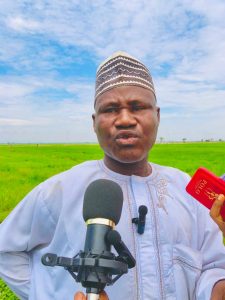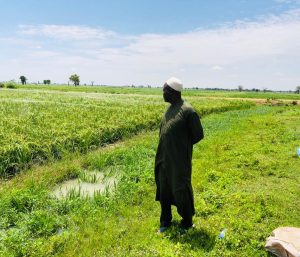By Mustapha Salisu
Rice farmers in Kura local government of Kano State boast that they have the capacity to feed the nation, but they complain about discrimination in the distribution of fertilizer and lack of government support.
Kura local government is located south of Kano city, approximately 30 kilometers away from the state metropolis. The town’s vibrant commercial activities along the road are transforming it into a linear settlement, with the market itself leaning towards the highway.
Speaking to FARMERS VOICE NG, the Head of Tukuba Farmers Multipurpose, Malam Ahmed Jinjiri Kura, who is also a commercial rice farmer, explained that Nigeria is blessed with vast agricultural land spread across several northern states such as Yobe, Katsina, Kano, Zamfara, Bauchi, and others.

Jinjiri stated, “Agriculture is the backbone of powerful countries in the world because without food, nobody can be physically or intellectually productive. Countries like China embraced farming due to their large population and overcame it before embracing technology.”
He further explained that in Kura, one acre of farmland can produce approximately 40 bags of rice, with each bag sold between N27,000 and N28,000.
Ahmed lamented that the cost mentioned earlier is subject to price fluctuations, which depend on the availability of the produce in the market.
“When there is a bountiful harvest, the price depreciates. Otherwise, the price will soar up.”
“If you, as a farmer, don’t have enough rice for consumption and marketing, you must sell at a higher price in order to make ends meet,” stated Jinjiri.
FARMERS VOICE NG gathered that rice farmers in Kura sell their produce internally to markets like Dawanau Market, Kwanar Dan Gora, Bichi, and others. Externally, they sell to cities such as Lagos, Benue, Port Harcourt, Ibadan, Owerri, Anambra, and more.

“By extension, we also sell mostly to companies like TIAMIN, which process the rice for other consumables,” Ahmed added.
Regarding their difficulties during the cashless policy era, Malam Ahmed said, “We, as local farmers, really suffered because we didn’t believe in online transactions.”
He noted that they preferred to transact with physical cash, as even online transactions faced issues at that time.
When asked about how they were coping with the subsidy removal when marketing their rice produce, Jinjiri explained that they hadn’t harvested the current crop, so they were yet to feel the impact.
“But pre-rainy season farmers are due to harvest their produce early next month, so we don’t know what the situation will look like.”
“We are urging the government to devise easier means for our rice farmers to market their produce without many obstacles,” he added.
Asked about modern means of marketing communication, Malam Ahmed revealed that rice farmers in Kura were lagging behind in utilizing social media platforms for marketing.
“Personally, I have learned about social media, particularly Facebook. I joined some rice farmers’ groups where I get updates related to our occupation. Currently, our customers are offline-based,” he noted.
FARMERS VOICE NG learned from Ahmed Jinjiri that their association, Tukuba Farmers Association, has not received any federal government intervention for eight years. However, it is uncertain whether the Rice Farmers’ Association of Nigeria (RIFAN) has also been lacking intervention for about eight years.
Speaking on the reopening of borders, the Chairman of AGOLAS Water Users Association, Malam Adamu Muhammad, popularly referred to as Alhaji Ado Kurau, explained that he had no issues with that.
He urged the current administration to implement programs that would alleviate the challenges faced by farmers in the country.
In his words, “We didn’t know the impact of the border closure on rice farming until former President Muhammadu Buhari implemented it. Now, we are concerned with the pros and cons of reopening the borders. We farm to send our children to gain valuable knowledge that will be beneficial to us, their families, and the nation as a whole,” stated Malam Ado.

